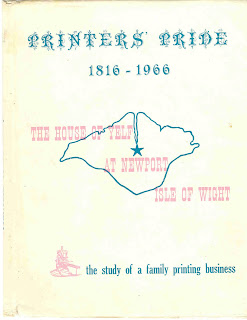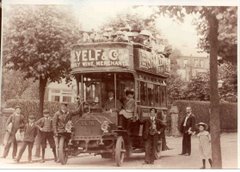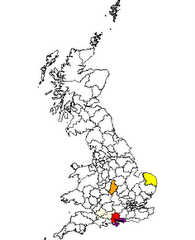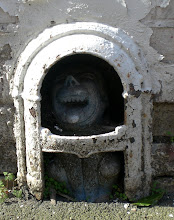
Anyone interested in researching the Yelf family history will at some point or another hope to obtain a copy of "Printers Pride 1816 - 1966" by A.N. Daish. This tells the story of Yelf & Son Printers at Newport, Isle of Wight. It's a good read too, although some of the early family history is a little bit suspect (the author confuses several Robert Yelf's, which is easily done, and also latches on to some incorrect family legends such as the Dutch connection). Of course the sections we can treat with a great deal more respect are those dealing directly with the dynasty of printers themselves. Except, it seems, where there might be a whiff of scandal in the air...
When I first read the book many years ago the following passage concerning the second and third generation of Yelf owners had nothing in it to suggest that anything out of the ordinary
The business plate of William Wheeler Yelf, son of the first William, remains in place today on the front door of Number 15 Holyrood Street. The second W is overstamped with an R recording the succession of William Richard to the business in 1856 on the death of his father. Although William Richard may not have been able to afford a completely new business plate (or was he possessed of a keener sense of historical values?) he appears to have prospered since by the 1880's he was using the imprint Isle of Wight Steam Printing WorksPretty innocuous really, and not much to raise the suspicion of anything wrong. However the succession from William to Richard took place following William Wheeler's death in a London prison whilst awaiting deportation! The 'keener sense of historical values' takes on a slightly different connotation in this light and suggets to me that the author might well have had some inkling of the traumatic events that rocked the business at this time, although it is now impossible to know for sure. Certainly writing in the '60's he would probably not have had such easy access to the records that we of the internet age enjoy so let's give him the benefit of the doubt.
So who exactly was William Wheeler Yelf? Well, he was born in about 1801, the son of William Yelf who founded the printing business in Newport, Isle of Wight. He married Elizabeth Jane Outridge and they in turn had six children - William, Harold, Elizabeth, Agnes, Gertrude and Clara. Although his main business lay with the printing, he had other interests, as a look through the trade directories of the time shows
Piggots Directory 1831 - Newport Isle of WightThe Yelfs were also staunch followers of the Wesleyan movement and the first William Yelf founded the Wesleyan Methodist Sunday School in 1810. In 1816 William Wheeler Yelf became a teacher there and eventually became a superintendent between 1826 to 1839. Not surprisingly he also seems to have attracted more than his fair share of religious printing jobs! William Wheeler was also secretary of the Blue School, a girl's charity school in Newport, subscriber to the relief of the poor and prominent in the list of charitable donations. All in all he seems to have been a respected, religious and successful businessman. In fact as Daish notes
Savings Bank - Guidhall (open every Monday morning from nine till ten) Wm Yelf, Secretary
Bookbinders - Yelf William W. Holyrood St.
Fire & Office Agent - London Union William W. Yelf Holyrood Street
Printer - William W. Yelf Holyrood Street
Misc. - Willington & Yelf Law Stationers and Stamp distributors, Holyrood Street
It may be suggested from his prompt payments that W. W. Yelf had a sound business awarenessSadly that image wasn't to remain untarnished for long as his 'business awareness' was found not only to be sound, but unscrupulous as well!
To be continued




































